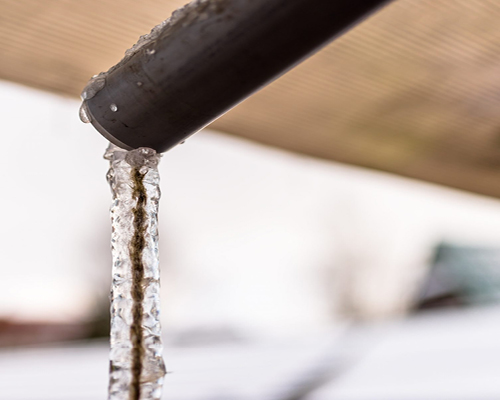Insight
Preventing Frozen Pipes In Your Home

Most of our pipes are hiding away behind walls or inside crawl spaces, so we don’t often think about them. During the winter, the water expands as it freezes inside your pipes, adding pressure and causing them to leak. You may not notice it as it is happening, but as the weather turns from cold to warm, water damage can start to become apparent when those same pipes begin to leak. If you get to that point, you’re stuck with costly repairs. But, the good news is, there are things you can do for preventing frozen pipes in your home.
The Usual Suspects
Any pipe in your home’s plumbing system can freeze, but of course, there are certain pipes that are most likely to do so. Those pipes that are outside your home and inside exterior walls are the ones that need special attention. Take extra care in protecting them from cold weather:
- Outdoor faucets and hose bibs, swimming pool water supply lines, and your sprinkler system
- Basement, Attic, Garage, Kitchen, and Bathroom Cabinets that aren’t heated
- Pipes inside exterior walls
- Any section of pipe exposed to the cold air
Preventing Frozen Pipes in Your Home
Frozen pipes can be prevented. And some of these things should be done before the weather begins to turn cold. Start by walking around your home, checking for pipes in areas that are unheated or not well insulated. Get a pipe sleeve, heat tape, or cable to prepare them for the cold and secure any weak spots.
When winter arrives perform these steps to prevent freezing pipes:
- Close all inside valves that supply water to outdoor faucets and hose bibs, sprinklers, and swimming pool lines.
- Let the remaining water out of those outdoor faucets by opening them. Keep them open with the water supply off on days with freezing weather.
- Keep your garage warm to protect the pipes inside by ensuring garage doors stay closed.
- Open the doors of cabinets to let the warm air in to warm the pipes.
- Drip water from the faucets when the temps drop below freezing.
- Make sure your heat is set above 55 degrees.
- Use pipe insulation to protect pipes
- Seal any cracks and openings around your windows, doors, and sills.
What to Do If You Have Frozen Pipes
Even with prevention, frozen pipes occur. Once this happens, there are things you can do to minimize the damage:
- Close the main water shutoff valve and water lines
- Open all faucets to drain all water still in the pipes
- Use buckets, towels, and fans to catch, clean, and dry the water.
- Turn the water on slowly to find the leak. Once you find a leak, turn the water off.
- Don’t attempt to heat your pipes with torches, heat or heat guns as they are fire hazards.
- Keep an eye out for signals that water leaks have happened.
- Have a licensed professional plumber come in to handle any repairs.
If you have a burst pipe, make the necessary calls to handle the cleanup and repairs. And make sure you call your homeowners’ insurance company. We can walk you through coverage and assist you in getting your home repaired. Learn more about homeowners’ insurance from The Secret Insurance Agency. Our focus is on keeping our clients safe and financially secure.